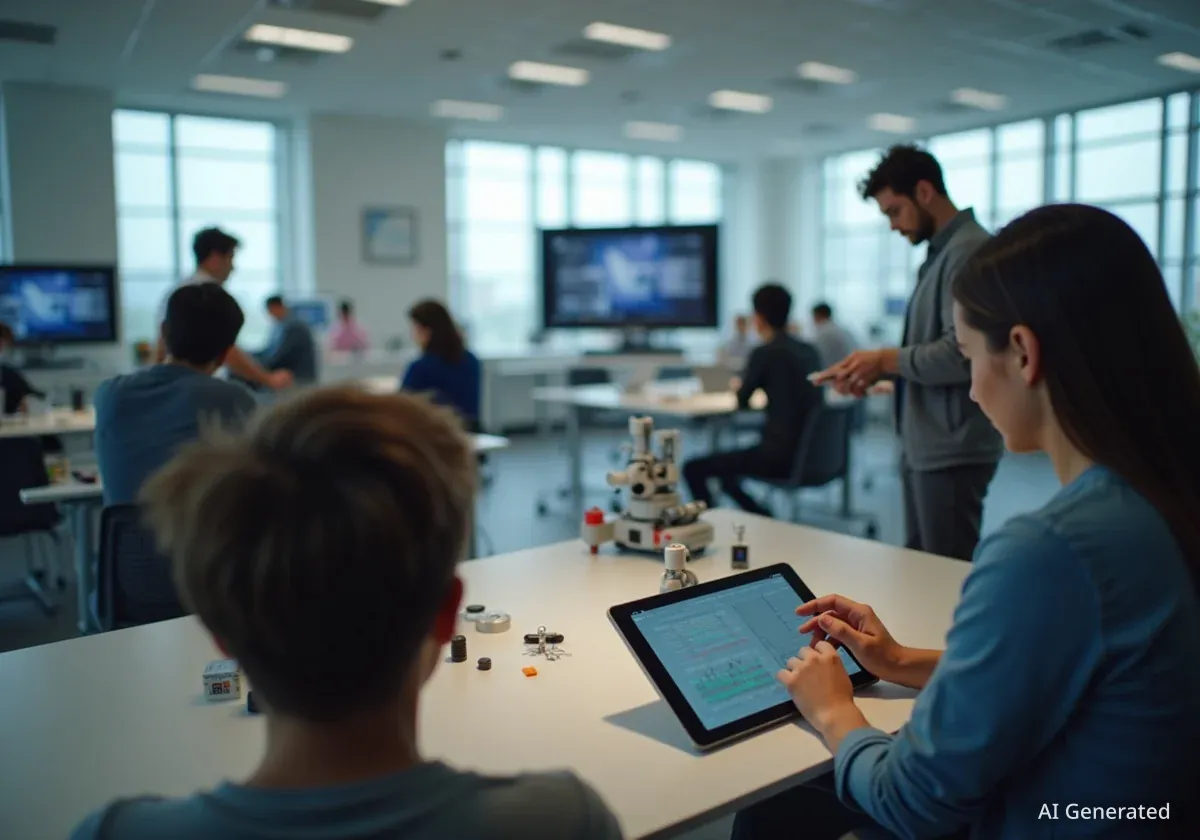A new private school in San Francisco, named Alpha, has implemented an educational model where artificial intelligence (AI) handles core subject instruction. This innovative approach removes traditional elements such as bells, grades, and even teachers in their conventional roles, aiming to reshape the student learning experience. The school, which opened with 15 students, plans to expand to 75 students next fall.
Key Takeaways
- Alpha, a new private school in San Francisco, uses AI for core subject instruction.
- The school eliminates traditional bells, grades, and teachers, replacing them with AI and adult guides.
- Students spend two hours daily on AI-taught core subjects, focusing the rest of the day on life skills.
- The annual tuition for Alpha is $75,000.
- Concerns about unregulated AI in education have been raised by education professionals.
AI Takes Center Stage in Learning
Alpha school is redefining education by placing artificial intelligence at the core of its academic program. Students engage with AI-powered applications for their main lessons. These applications guide learning without chat functions, instead using a "vision model" to observe student progress on screen and offer coaching for more effective learning.
Thirteen-year-old June Rockefeller, a student at Alpha, expressed enthusiasm for the new model. "I love school so much now. I think it's just really fun," she stated. This sentiment highlights a shift in student perception of learning, moving away from traditional structures.
School Structure at Alpha
- Core Subjects: Taught by AI-powered apps.
- Daily Schedule: Two hours for core subjects; remainder for hands-on life skills and passion projects.
- Adult Roles: "Guides and coaches" provide motivational and emotional support.
- Traditional Elements Removed: Bells, grades, and conventional teachers.
Focus on Skills and Projects
Beyond the two hours dedicated to AI-led core subjects, Alpha students spend their day on practical life skills and personal passion projects. This structure aims to foster creativity and real-world application of knowledge. For example, 14-year-old Ethan Wong is utilizing AI to develop an app for molecular gastronomy.
Wong values the school's focus on practical engagement. "I really enjoy spending less time doing academics and spending more time doing things I love," he noted. His father, James Wong, initially had reservations but became convinced after seeing his son's positive response to the new system.
"I had not seen that smile when he exited school in a very long time," James Wong said, reflecting on his son's improved school experience.
Educational Innovation
The education sector has often been slow to adopt new technologies and methodologies. Carson Lehmann, Alpha's lead guide, believes that traditional education models have not kept pace with societal changes and technological advancements. He aims to empower students to create and innovate without needing extensive prior knowledge or advanced degrees.
Cost and Concerns
Alpha school's innovative approach comes with a significant annual tuition fee of $75,000. This cost is higher than that of many Ivy League universities. The school asserts that students from its other campuses achieve high academic results, scoring in the top one to two percent nationally across all grade levels.
Despite the school's claims, the integration of AI in such a central role raises questions among education professionals. Cassondra Curiel, president of United Educators of San Francisco, expressed caution regarding the untested nature of AI in this context.
"What needs to be made really clear is that some of the consequences of unregulated and currently unstudied AI in education settings could have potentially really impactful and negative effects on our students," Curiel warned.
The school launched with a small group of 15 students. For the upcoming fall semester, Alpha aims to enroll 75 students, with scholarship opportunities available for some families. June Rockefeller, for her part, remains committed to the school's model. "It's high standards, but it doesn't stress me out," she stated.
The Future of AI in Education
The Alpha school model represents a bold step into the future of education. By leveraging AI for foundational learning, the school seeks to free up student time for hands-on projects and personal development. This model challenges long-standing educational norms.
The high tuition suggests that this form of AI-centric education may initially be accessible only to a select few. However, its outcomes could influence broader discussions about technology's role in learning.
Questions about the long-term impact on social development, critical thinking without human teacher interaction, and the ethical implications of AI in formative years remain. As AI technology continues to advance, schools like Alpha will be closely watched to understand both the benefits and potential drawbacks of such a radical educational shift.
The integration of AI into daily learning routines could lead to personalized educational paths, adapting to each student's pace and style. This could potentially address the diverse needs of learners more effectively than traditional classroom settings. However, it also demands new frameworks for assessing student progress and ensuring comprehensive development.
The shift from human teachers to AI guides also prompts a re-evaluation of the role of educators. Instead of delivering content, adults at Alpha serve as mentors, focusing on student motivation and emotional well-being. This specialized role could enhance support systems for students, but it also changes the fundamental relationship between student and instructor.
Ultimately, Alpha's experiment with AI-led education provides a real-world case study for the promises and challenges of integrating advanced technology into learning environments. Its success or failure could significantly shape future educational policies and practices.





